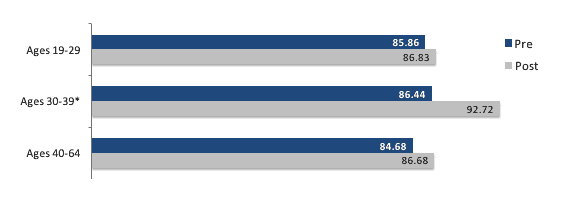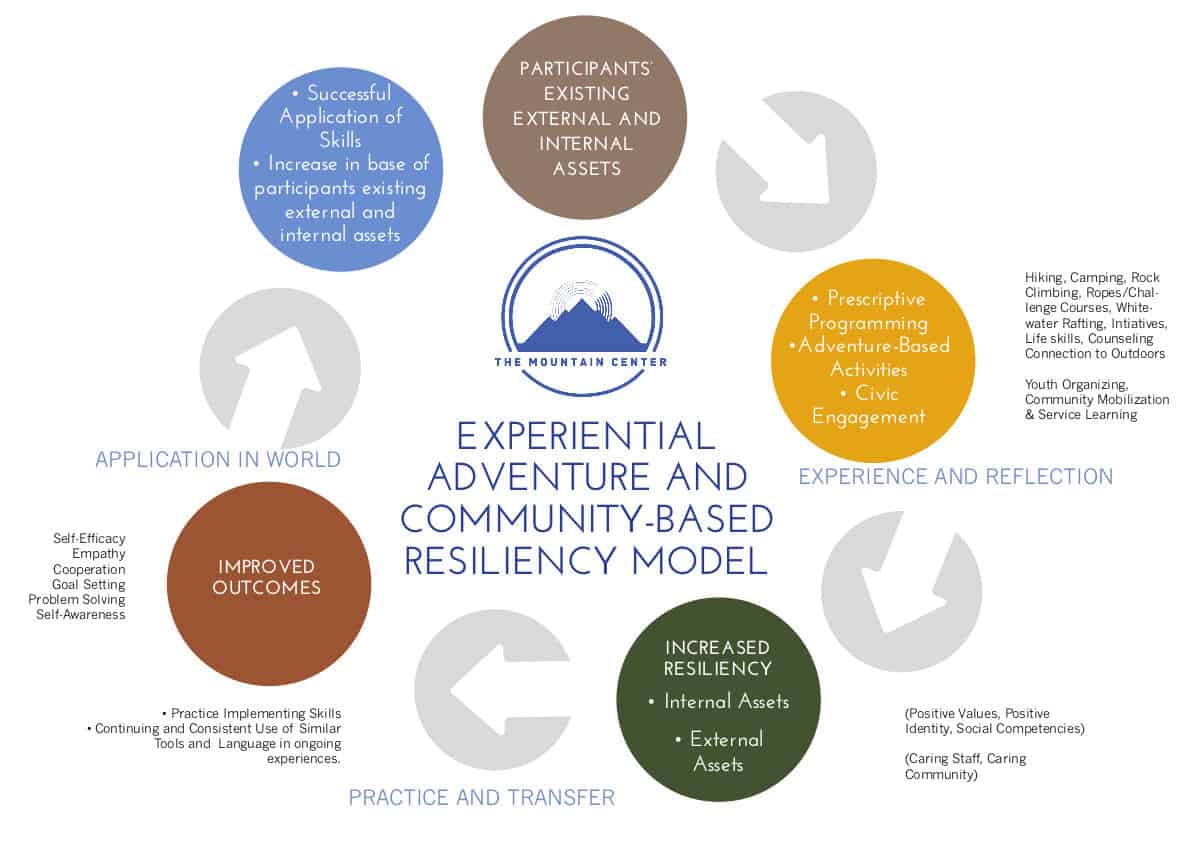WHAT WE DO
The Mountain Center is a nationally recognized and accredited 501(C)3 educational and therapeutic organization dedicated to promoting personal discovery and social change through the use of creative learning experiences in wilderness, community, and cultural environments.
The Mountain Center's Experiential Adventure and Community-Based Resiliency Model® incorporates elements of adventure, education, and challenge to help participants break through self-limiting beliefs, discover their potential, and build positive self-identity and resiliency. This unique model guides individuals to:
- Develop self-esteem, self-confidence, and self-awareness
- Learn positive values
- Develop better social skills and relationships
- Facilitate positive changes in communities
The Mountain Center is successful because we focus on building strengths rather than identifying weaknesses. We are passionate about providing services for and reaching out to those in our community who are most in need. We partner with community and government agencies, Native American communities, and nonprofits in order to formulate collaborative strategies that deliver positive outcomes and outreach to underserved individuals.
The Mountain Center’s Person-Centered Philosophy
At The Mountain Center (TMC), our person-centered philosophy is a foundational commitment that shapes every aspect of our work. This approach ensures that the individuals, families, groups, and communities we serve are always at the heart of our decisions, practices, and policies.
Rooted in our mission, vision, and values, our work is further guided by three core programmatic approaches: Trauma-Informed Care, Harm Reduction, and Experiential Education. These frameworks not only support our person-centered philosophy but also help us deliver services in ways that are empathetic, responsive, and empowering.
We believe that every person deserves to be heard, valued, and supported—in ways that are aligned with their personal goals and definitions of well-being. This belief is not just a value—it is embedded in our organizational structure, program design, and daily operations.
There are many layers to TMC, and across all of them, we remain guided by a unified purpose: to serve our clients and communities with integrity, compassion, and respect. In every policy we draft, in every decision we make, and in every relationship we build, our commitment to person-centered care remains constant.
RESILIENCE THEORY
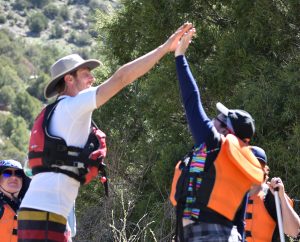
What is Resiliency?
Resiliency and positive behavioral development are aligned in addressing the person holistically and focusing on individual assets rather than deficits. Research, beginning in the 1980s, which focused on children and youth, showed that while some people who were exposed to high-risk situations developed antisocial behaviors, the majority did not. For example, research has shown that one in four children who grow up in an alcoholic home will become alcoholics. But: three in four will not.
Building upon this realization, researchers worked to discover what was preventing people from behaving in antisocial ways. Their developing understanding is that people have strengths, which programs and institutions can develop and enhance in order to protect them from poor outcomes. Researchers further developed the understanding that people could bounce back from participating in these unhealthy behaviors and become competent, well-adjusted people.
Resiliency and positive youth development both have an approach that says it is vital to build upon strengths people already have. Positive youth development looks not only to how your organization can be an agent for promoting positive youth development, but how your organization can work with other institutions in your community to do so. “The resilient child is one who works well, plays well, loves well, and expects well.”
Social competency, problem-solving skills, autonomy (a strong sense of identity, an ability to work independently, and a belief that you will be effective) and a sense of purpose and future are all commonly identified attributes of resilient children and youth. Much of this can be applied to development in adults—as shown by our evaluation data.
Elements for Cultivating an Environment To Build Resiliency
On any given Mountain Center program and engagement strategy, you will find the following steps applied as a core principle and foundation for the support and growth of building resiliency.
- We invite and create a safe space for individuals, groups, and communities to participate in—environments that are physically, emotionally, and culturally safe.
- We acknowledge the existing internal and external strengths and assets of individuals, groups, and communities.
- We create intentional environments in which individuals, groups, and communities engage in the true purpose of our programming and/or services (adventure, life skills, harm reduction, community engagement).
- We facilitate and create supportive environments where individuals and groups can connect with others (group or community members) and reflect on their experiences.
- We create environments where individuals and groups process their experiences and transfer those experiences back into their communities and their lives at home.
Our Experiential Adventure and Community-Based Resiliency Model® puts these principles into action.
Benard, Bonnie; Fostering Resiliency in Kids: Protective Factors in the Family, School, and Community; National Resilience Resource Center, University of Minnesota; Minneapolis, MN; www.cce.umn.edu/nrrc
Garmezy, Norman. “The Study of Competence in Children at Risk for Severe Psychopathology.” In The Child in His Family, vol. 3: “Children at Psychiatric Risk,” edited by E. J. Anthony, 1974, 77-98.
Werner, Emmy & Ruth Smith. Vulnerable But Invincible: A Longitudinal Study of Resilient Children and Youth. New York: Adams, Bannister, and Cox, 1989 (1st edition 1982).
Experiential Education & Adventure Theory
What is Experiential Education?
Experiential education and adventure believe and practice that at the heart of all learning is bringing meaning to our experiences. The meaning-making process is critical to understanding and learning from our experiences. Though there is no one consistent definition of experiential education, many point to the definition set forth by the Association of Experiential Education: “A philosophy and methodology in which educators purposefully engage with learners in direct experience and focused reflection in order to increase knowledge, develop skills, and clarify values.”
What is Adventure?
Adventure is a way of doing; it is not just an activity in and of itself. If the word adventure conjures up images of things like rock climbing, rafting and parachuting, pause for a moment and imagine instead the way in which an activity is performed. A session becomes an adventure for participants if an element of surprise exists, if activities compel them to do things they have never imagined possible. Adventure exists when there is engagement, and engagement comes from providing participants with experiences that are unique and relevant and, hence, therapeutic and/or educational. These concepts are equally true for and applicable to all TMC participants, from a youth organizing initiative to one of our therapeutic programs.
Adventure includes challenge—moments when participants are on the brink of both success and failure and where they both succeed and fail. Adventure is about taking risks—not necessarily physical risks, but emotional and apparent physical risks, where participants see the natural consequences before them. Perhaps just connecting action to consequence is vital; knowing it is one thing, experiencing it is another. For participants to experience adventure, a program must provide physical and emotional safety—a space where participants can speak their minds and stretch themselves to new limits. While all of this is challenging, it also has a purposeful element of fun and play through which participants become willingly engaged.
Why Use Adventure?
Importantly, adventure helps us practice the resiliency and positive youth development approaches in which we believe. Adventure values who we are and what we know right now as it helps us grow.
- Adventure, when well done, is engaging—it is fun and participants want to take part in it.
- Adventure learning allows participants to experience a behavior (positive or not), reflect on that behavior, learn to replicate or diminish (as is appropriate) that behavior and learn how to transfer that behavior to other settings.
- Adventure requires its participants to be responsible to self, community, and others.
- Adventure requires its participants to grow. Participants will not be able to “sit” in their comfort zone but must learn in their stretch zone.
- The adventure process relies on peers—just from whom the developmentally typical youth seeks approval. (While adults are not normally swayed by peer pressure, there is a lot of power in ten people telling you something versus your spouse—for example—alone telling you.)
- Adventure is assets-based. While not ignoring those areas where participants need to grow, it focuses on cultivating and developing strengths.
- Adventure is well aligned to provide TMC participants with the skills and perceptions advocated by: the Search Institute, resiliency theorists and researchers, positive youth development theorists and researchers, Stephen Glenn, youth organizing principles, and the guiding principles of the TMC.
Learn about - Experiential Education and Adventure Theory
Social Change THeory
Social change is a process that embodies an understanding and identification of issues, challenges and barriers that affect disenfranchised people’s lives. While we focus on individual change, we also use approaches and theoretical frameworks that empower groups of people to gain knowledge, resources and skills to address issues directly affecting their lives; e.g., HIV/AIDS, Native American language and cultural identity, lesbian, gay, bisexual transgender and questioning (LBGTQ) youth harassment, and environmental concerns. Looking at the demographics of the youth and adults we serve in our programs, they are mostly from communities that have endured generations of socially instilled injustices. By focusing on change within the context of social justice in our youth, adult and community development work, we have the ability to affect a depth of systemic shift unusual in the experiential education arena.
Harm Reduction Philosophy
The term “harm reduction” is used to describe any set of strategies designed to minimize the potential adverse consequences of inherently risky activities or behaviors, such as the use of seat belts when driving a car or ropes and helmets when rock climbing. It is most commonly associated with evidence-based interventions and services, such as syringe exchange, that target People Who Inject Substances (PWIS) who are:
- At risk for contracting diseases such as HIV and Hepatitis C (HCV) through the reuse and sharing of injection equipment
- At risk for other injection-related complications such as MRSA (antibiotic-resistant staph), vein damage, and soft tissue infections
- At risk for overdose
- Potentially engaged in high-risk sexual activity
This philosophy is applied and embedded in all The Mountain Center programming, within the context of the large social and emotional environment of individuals, groups and communities with whom we work.
Staff Training and Risk Management
All Mountain Center staff are trained in a variety of modalities, including clinical, technical and medical. For example, all lead staff members who lead youth and adult programs in wilderness settings have Wilderness First Aid or Wilderness First Responder CPR certification and any staff leading ropes course events (or any technical operation) goes through a rigorous and thorough training and vetting before running such an activity.
Staff on average participate in 12 in-house trainings that cover risk management, clinical, cultural, technical and programmatic education and application. There are also an average of four or more trainings a year done by outside trainers and consultants with whom we partner and who provide us with overall support and organizational growth and knowledge.
The Mountain Center proudly has a team of volunteers that make up our Risk Management Committee. Each member comes with a passion to support our mission and have experience in a related or relevant field. The Risk Management Committee meets quarterly to review incidents and accidents and supports the Mountain Center in making sound and conservative decisions for mitigating risk and exposure to clients, staff and stakeholders.
Accreditation
We are proud to be a member and accredited by the Association for Experiential Education (AEE). By being accredited by AEE, the Mountain Center is held to standards of risk management and overall best practices in the field of adventure and experiential education.
This is what AEE has to say about accreditation:
“Programs that have gone through the AEE Accreditation process have distinguished themselves in the growing field of experiential education. During the accreditation review, programs must demonstrate compliance with the standards for adventure and outdoor behavioral healthcare programs. Attaining accredited status through the AEE Accreditation Program is evidence of an organization's commitment to quality, adherence to widely recognized professional standards, and the allocation of resources toward continuous improvement.”
Since 2000, the Mountain Center has been accredited by AEE, under their standards of Outdoor Behavioral Healthcare (OBH) and Adventure Programming.
We are a Health Insurance Portability and Accountability Act (HIPAA) Compliant Organization.
Evaluations Data and Outcomes
Our outcome data prove that our work is a powerful vehicle for developing self-worth, responsibility, compassion, and connection to community.
The Mountain Center’s innovative programming uses a strength-based, positive youth development approach to provide intervention and prevention services to adjudicated youth, at-risk populations, shelters, and treatment centers. Utilizing our Experiential Adventure and Community-Based Resiliency Model, we work closely with agencies and groups to prescriptively design programs that meet the presenting needs of each client group. The Mountain Center provides dynamic therapeutic learning experiences that incorporate elements of adventure, challenge, and interpersonal processing/reflection coupled with a life-skills curriculum. These experiences include cooperative games, problem-solving initiatives, high-ropes challenge courses, rock climbing, backpacking, and rafting. Programs can consist of sequences of four to ten sessions, overnight therapeutic camps, and/or wilderness experience programs.
Evaluation Methods
- Internal Assets Resilience Module - administered pre and post for all participants that attended more than one day of programming.
- Client Satisfaction Survey - administered to all program participants at the end of each program.
- Referral Agent Survey - administered to representatives of agencies sending participants to SFMC programs.
YOUTH PROGRAMS
Figure 1 - Pre and Post Mean Scores for Resilience Sub-Scales Across All Respondents
July 2016 - June 2017
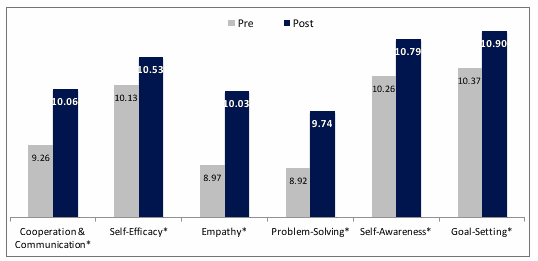
Figure 2 – Pre and Post Mean Resilience Scores by Age Group
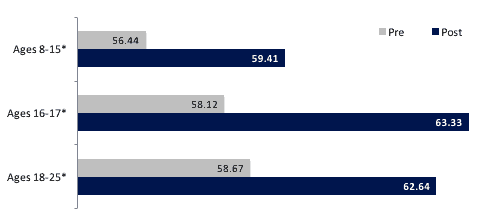
PROGRAMS WITH ADULTS
Figure 1 - Pre and Post Mean Scores for Sub-Scales Across All Respondents
July 2016 - June 2017
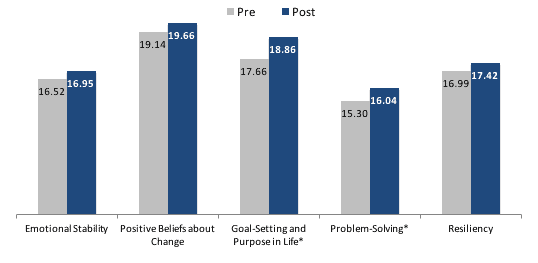
Figure 2 - Overall Pre and Post Mean Scores by Age Group
